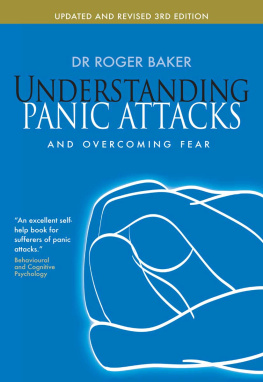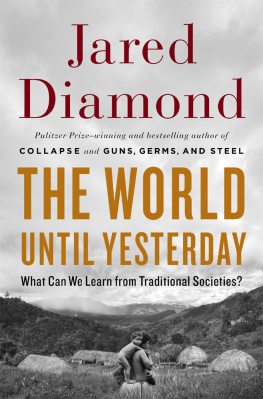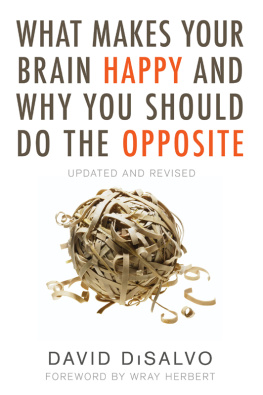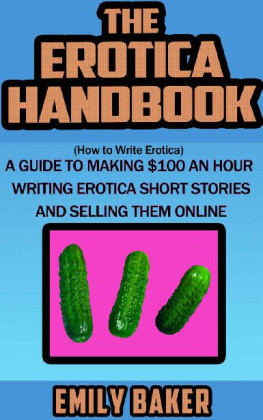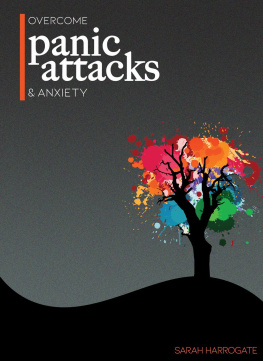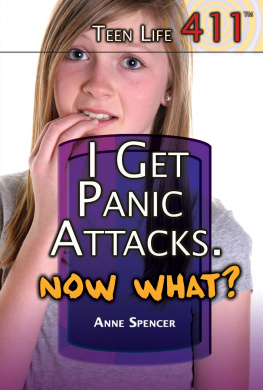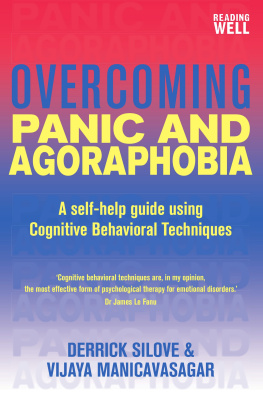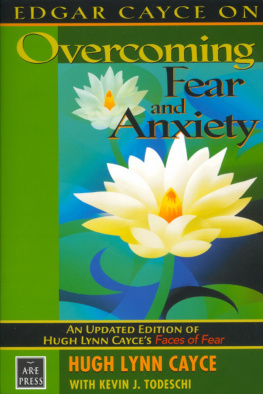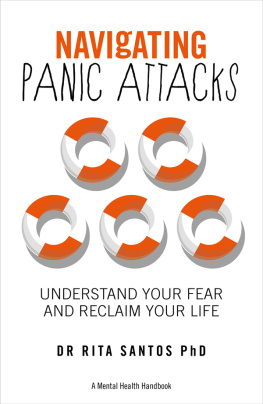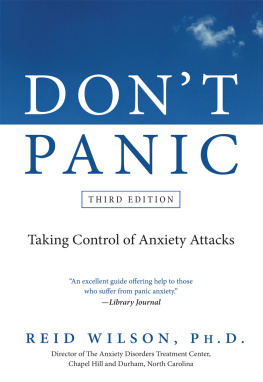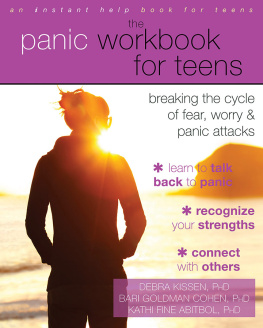Baker - Understanding Panic Attacks and Overcoming Fear : Updated and Revised 3rd Edition.
Here you can read online Baker - Understanding Panic Attacks and Overcoming Fear : Updated and Revised 3rd Edition. full text of the book (entire story) in english for free. Download pdf and epub, get meaning, cover and reviews about this ebook. City: Chicago, year: 2011, publisher: Lion Hudson, genre: Religion. Description of the work, (preface) as well as reviews are available. Best literature library LitArk.com created for fans of good reading and offers a wide selection of genres:
Romance novel
Science fiction
Adventure
Detective
Science
History
Home and family
Prose
Art
Politics
Computer
Non-fiction
Religion
Business
Children
Humor
Choose a favorite category and find really read worthwhile books. Enjoy immersion in the world of imagination, feel the emotions of the characters or learn something new for yourself, make an fascinating discovery.
Understanding Panic Attacks and Overcoming Fear : Updated and Revised 3rd Edition.: summary, description and annotation
We offer to read an annotation, description, summary or preface (depends on what the author of the book "Understanding Panic Attacks and Overcoming Fear : Updated and Revised 3rd Edition." wrote himself). If you haven't found the necessary information about the book — write in the comments, we will try to find it.
Understanding Panic Attacks and Overcoming Fear : Updated and Revised 3rd Edition. — read online for free the complete book (whole text) full work
Below is the text of the book, divided by pages. System saving the place of the last page read, allows you to conveniently read the book "Understanding Panic Attacks and Overcoming Fear : Updated and Revised 3rd Edition." online for free, without having to search again every time where you left off. Put a bookmark, and you can go to the page where you finished reading at any time.
Font size:
Interval:
Bookmark:
AND OVERCOMING FEAR

Copyright 1995, 2003, 2011 Roger Baker
This edition copyright 2011 Lion Hudson
The author asserts the moral right to be identified as the author of this work
A Lion Book
an imprint of
Lion Hudson plc
Wilkinson House, Jordan Hill Road,
Oxford OX2 8DR, England
www.lionhudson.com
ISBN 978 0 7459 5545 2 (print)
ISBN 978 0 7459 5961 0 (e-pub)
ISBN 978 0 7459 5960 3 (Kindle)
ISBN 978 0 7459 5962 7 (pdf)
First edition 1995
This edition 2011
First electronic format 2011
All rights reserved
Distributed by:
UK: Marston Book Services, PO Box 269, Abingdon, Oxon, OX14 4YN
USA: Trafalgar Square Publishing, 814 N. Franklin Street, Chicago, IL 60610
USA Christian Market: Kregel Publications, PO Box 2607, Grand Rapids, Michigan 49501
Cover: Stavros/SIS Ltd
A catalogue record for this book is available from the British Library
I would like to thank all the patients who have allowed me to quote their experiences in this book. I am indebted to my wife, Ann, who painstakingly typed this manuscript on the basis of my indecipherable handwritten pages, and gave me really useful feedback on the balance and emphasis of the book. Lisa Gale, Dan Marshall, and Eimear Corrigan, research psychologists, read the second edition of the book, researched the latest developments in panic, and provided invaluable advice and recommendations on the shape of this new edition. Lastly, I would like to acknowledge the role of Malcolm McFadyen, a clinical psychologist with whom I worked at the Royal Cornhill Hospital in Aberdeen, and who originally developed the ideas behind the cognitive therapy approach described in this book.
I would gladly have sold my soul to the devil for just one day of complete health. I would unhesitatingly have given away everything I had to anyone who could have guaranteed just twenty-four hours of normal health.
I have been a sufferer for almost twenty-nine years, since I was serving with the Royal Navy. Of course, I dont have to tell you the hell that I have existed in.
I see a man hobbling past my house on crutches, a cripple for life, and I actually envy him.
What are these people talking about? Why are they so desperate? What is it that is so bad that they would envy a man on crutches? The answer is panic anxiety.
We all know what anxiety is like before an exam, when we have to give an important speech, reaching the finals in a sports event, or going to the dentist. But when anxiety breaks through into a persons life in a really powerful way and there seems to be no good reason for it, that is different. Daily life, work, and relationships can get more and more disrupted by these unpleasant feelings that cannot be controlled.
LIKE LIVING IN HELL
It can really begin to feel like living in hell as sufferers twist and turn, trying to shake off these feelings. People with panic anxiety often say that it is impossible for others to understand what they are going through, like explaining the colour red to a blind person. The frustrating thing is that once they seemed to be leading an ordinary life. Then one day panic struck, and everything changed. Now they live in dread of unbearable panic feelings and wonder if they will ever get back to normal again.
Mrs A. went to the checkout at Morrisons to pay for some shopping and felt her heart starting to race and her mouth go dry. She couldnt get her money out of her purse because her hands were shaking so much. She rushed home. After this, she was overcome with anxiety every time she left the house alone. She had to be accompanied by one of her family. Even now, years later, she dreads going out of the house, and goes to great lengths to make sure she is never left in the house by herself.
Miss M. loved her job as a travel consultant, but after a panic attack on a busy train in Italy, she gave up work altogether, and after a long spell she was only prepared to work in a rather undemanding job involving no travel.
Mr P. would start to shake and tremble and feel nauseous during meetings at his work in the oil industry. He was sure he would vomit or be seen shaking by his colleagues, and had made so many excuses for leaving meetings that he felt his job was in jeopardy.
Mrs C. dearly wanted children but because of panic attacks put it off and off until it was too late. I thought, How could I cope with a baby? So often Im housebound.
These are descriptions of people who have had panic attacks. No two people describe it in quite the same way. For some, it is the heart palpitations that are unbearable, for others dizzy sensations or feeling unreal, and for others difficulty in breathing or choking sensations. But they all share one thing. Their lives have been devastated by panic anxiety. One attack on a fateful day turned their life around and took it in a direction they did not want or choose. It made them look inwards at themselves rather than outwards. It put a strain on their relationships. It was a daily source of dread.
WHAT IS A PANIC ATTACK?
Throughout the centuries people have suffered from panic attacks. In sixteenth-century France, they called them terreur panique . One English writer described panic attacks in 1603 as sudden foolish frights, without any certeine cause, which they call panique terrores. Sigmund Freud was one of the first to give an accurate description of panic attacks in 1884, calling them anxiety attacks rather than panic attacks. Panic attacks were fairly much ignored by the medical and psychological professions until a century later. In 1980, the American Psychiatric Association included panic attacks in their Diagnostic and Statistical Manual , a sort of psychiatrists Bible for diagnosing emotional problems. The definition in this manual has become the accepted standard of what a panic attack is. The updated manual of 2000 states that the following thirteen sensations are the main ones to occur in panic attacks:
- palpitations, pounding heart, or accelerated heart rate
- sweating
- trembling or shaking
- shortness of breath or smothering sensations
- feeling of choking
- chest pain or discomfort
- feeling nauseous or having a nervous tummy
- dizziness, unsteadiness, or faintness
- feeling unreal or depersonalized (feeling detached from oneself)
- fear of loss of control or going crazy
- fear of dying
- numbness or tingling feelings
- chills or hot flushes.
To qualify as a panic attack, four of these feelings (any four) have to start suddenly, unexpectedly, and reach a peak within a ten-minute period. There should be no obvious life-threatening situation setting them off.
Many sufferers experience more than four sensations. The sort of sensations they notice may not be exactly the same one week as another week. What bothers one person may not bother another. The term limited panic attacks is used when someone suffers from only one or two of these feelings out of the blue. I am saying only one or two, but this gives the wrong impression, because for these people one or two of these sensations catching them unawares can be worrying, aggravating, and frequent enough to spoil their lives.
CAN I BE NORMAL IF I HAVE PANIC ATTACKS?
Although the Diagnostic and Statistical Manual has been very useful in drawing attention to panic attacks, it has been unhelpful in another way. The manual invented the term panic disorder for people who regularly have panic attacks or live in fear of panic. While it may be useful to have a medical-sounding name for insurance claims, it unfortunately gives the impression that the person is suffering from some sort of medical illness or disease, which panic is not.
Font size:
Interval:
Bookmark:
Similar books «Understanding Panic Attacks and Overcoming Fear : Updated and Revised 3rd Edition.»
Look at similar books to Understanding Panic Attacks and Overcoming Fear : Updated and Revised 3rd Edition.. We have selected literature similar in name and meaning in the hope of providing readers with more options to find new, interesting, not yet read works.
Discussion, reviews of the book Understanding Panic Attacks and Overcoming Fear : Updated and Revised 3rd Edition. and just readers' own opinions. Leave your comments, write what you think about the work, its meaning or the main characters. Specify what exactly you liked and what you didn't like, and why you think so.

